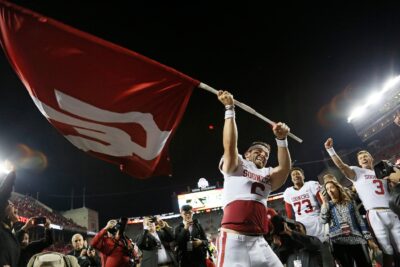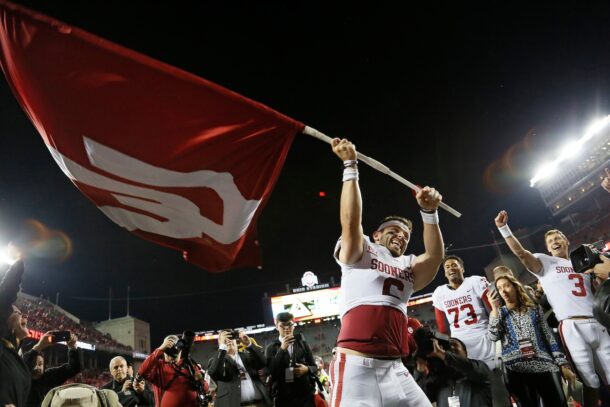
Jake Coker doesn’t have the look and feel of a championship quarterback
By John Crist
Published:
In all likelihood, if Alabama is going to win yet another national championship, it won’t be due to the quarterback play of Jake Coker.
However, even though the Crimson Tide will always be built around running the football and playing tough defense under coach Nick Saban, his three national-title teams in Tuscaloosa got strong performances under center. While Greg McElroy and A.J. McCarron have a grand total of three NFL starts between them — both of McCarron’s came this month — they were capable of throwing their way to victory at the collegiate level if necessary.
McElroy was 28th in the country in passer efficiency rating when he took ‘Bama to the top in 2009, and McCarron was 25th and first, respectively, when the Tide went all the way in 2011 and 2012.
Coker, on the other hand, is 44th, well behind the other three QBs participating in the College Football Playoff. Oklahoma’s Baker Mayfield is No. 2, Clemson’s Deshaun Watson is No. 11 and Michigan State’s Connor Cook — he’ll square off with Coker on Thursday in the Cotton Bowl — is No. 37, and all three got at least two first-place votes for the Heisman Trophy.
Sure, offensive coordinator Lane Kiffin was wise to lean on Heisman-winning running back Derrick Henry more often than not, but giving him 46 carries in the Iron Bowl and 44 more in the SEC Championship Game suggested that he doesn’t fully trust Coker.
Coker vs. Sims
With the exception of the passing offense, this 2015 ‘Bama team looks remarkably similar to the one that made the playoff in 2014.
https://twitter.com/SCollegeSports/status/677244279182376960
Coker has completed 65.7 percent of his passes for 2,489 yards with 17 touchdowns and 8 interceptions, plus he has been sacked 18 times in 13 games. There are seemingly no holes offensively from a personnel perspective, as Henry is a beast, wide receivers Calvin Ridley and ArDarius Stewart are both fabulous, tight end O.J. Howard is a matchup nightmare and center Ryan Kelly — the Rimington Award winner — anchors a dependable line.
Compare that to last year’s statistics from former starter Blake Sims, who had a 64.5-percent completion rate, 3,731 yards yards through the air and a TD-to-INT ratio of 30-to-10, all while only being sacked 13 times in 14 games.
Even with Henry developing into the SEC’s single-season rushing leader, Alabama’s ground assault hasn’t necessarily been better than it was a year ago. The Crimson Tide rush for 208.2 yards per game, while last year — Henry and current Jacksonville Jaguars starter T.J. Yeldon shared the load — it was a similar 206.6.
No question, Sims benefited greatly by having future No. 4-overall pick Amari Cooper as his primary target, but Ridley is a star in the making and Stewart seems to have an NFL career on the horizon, too.
It’s understandable that Coker couldn’t beat out Jameis Winston at Florida State, as Winston went on to win a Heisman and a national title before being selected No. 1 in the draft. But the fact that Coker couldn’t beat out Sims after tranferring to ‘Bama was telling, as Sims was never offered a contract in the NFL — his showing at the Scouting Combine was, in a word, bad — and has been released by two CFL franchises already.
According to Rob Rang, an NFL draft expert for CBS, Coker is a “developmental prospect” because he’s 6-foot-5 and 232 pounds with a big arm, but even with these “intriguing traits” he’s rated lower than BYU’s Taysom Hill and James Madison’s Vad Lee.
Who? Exactly.
History not on Alabama’s side
Beginning in 1998, throughout the 16-year run of the BCS and the first installment of the College Football Playoff, you would be hard-pressed to find a national champion that didn’t include a quarterback among its best players.
Excluding Ohio State’s Cardale Jones, who is still in Columbus following last year’s title run, the only one that didn’t at least get drafted into the NFL was Florida’s Chris Leak — yet he was MVP of the BCS Championship Game. Five of them (the aforementioned Winston, USC’s Matt Leinart, Texas’ Vince Young, Florida’s Tim Tebow and Auburn’s Cam Newton) were first-rounders, with both Winston and Newton going No. 1.
While Tee Martin, Josh Heupel, Ken Dorsey, Craig Krenzel, Matt Mauck and others ultimately did next to nothing professionally, none was considered a potential liability when that crystal football was on the line.
That seems to be the case for Coker, who was asked to do less and less as the season wore on due to Henry’s dominance and the defense’s stinginess. The one fourth-quarter comeback he directed this year — a 19-14 triumph over unranked Tennessee in the friendly confines of Bryant-Denny Stadium — the game-winning drive featured five Henry runs called by Kiffin on the final six plays.
https://twitter.com/TodaysUSports/status/674987815231463425
The two passes Coker completed on that eight-play march, a 29-yarder to Stewart and then a 15-yarder to Ridley, were more the result of brilliant catches than pinpoint throws.
No back is unstoppable
As good as Henry is, and he’s been incredibly consistent, it would be foolish for ‘Bama fans to book him for 200 yards.
Michigan State has the No. 8 rushing defense in the country, surrendering just 113.1 yards per game. The Spartans’ biggest victory came over defending national champion Ohio State, when they limited Ezekiel Elliot — another Heisman-caliber ball carrier — to 12 carries for 33 yards and took control of the Big Ten East.
Remember, Alabama got back into the SEC West race by holding LSU’s Leonard Fournette, arguably the most talented runner in the land, to 31 yards on 19 attempts.
On paper, the Crimson Tide are sitting pretty if Michigan State loads the box with defenders, as Ridley and Stewart can shred a Spartans pass defense ranked 74th nationally. However, the one time Coker was asked to throw the ball more than 33 times — he averages just 26 attempts per game — he was out of his element in a loss to Ole Miss at home.
Even if the Tide look like a championship team, and they do at almost every position, Coker doesn’t feel like a championship quarterback.
John Crist is an award-winning contributor to Saturday Down South.







